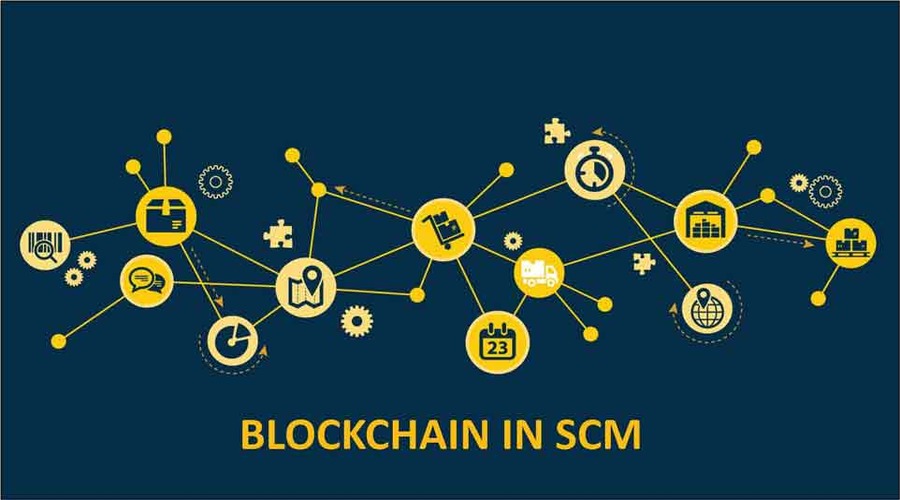Blockchain technology has revolutionized various industries, and one area where it holds tremendous potential is supply chain management. In this article, we will delve into the world of blockchain security and explore its role in ensuring the integrity, transparency, and efficiency of supply chains.
Introduction to Supply Chain Management and Blockchain
Supply chain management is a complex process that involves the coordination of multiple stakeholders, including suppliers, manufacturers, distributors, and retailers, to deliver products and services to end consumers. However, traditional supply chains often suffer from inherent inefficiencies, lack of transparency, and security vulnerabilities. This is where blockchain technology comes into play.
Blockchain is a distributed ledger technology that enables secure, transparent, and tamper-proof record-keeping. It provides a decentralized and immutable database that can be accessed and verified by all participants in the network. With its unique features, blockchain has the potential to address many of the security challenges faced by supply chain management.
Understanding Blockchain Technology
At its core, a blockchain is a chain of blocks, where each block contains a list of transactions. These blocks are linked together using cryptographic hashes, forming a chronological and immutable record of all transactions. The decentralized nature of blockchain ensures that no single entity has control over the entire network, making it resistant to tampering and fraud.
Blockchain operates on a peer-to-peer network, where participants, also known as nodes, validate and verify transactions through a consensus mechanism. This eliminates the need for intermediaries and reduces the risk of single points of failure. The transparency of blockchain allows all participants to view and audit the entire transaction history, promoting trust and accountability.
Security Challenges in Supply Chain Management
Traditional supply chains often face several security challenges that can compromise the integrity and reliability of the system. Counterfeiting and fraud are major concerns, as counterfeit products not only impact revenue but also pose significant risks to consumer safety. Lack of transparency and traceability makes it difficult to identify the origin of products and track their journey through the supply chain. Moreover, data breaches and cyberattacks can result in the theft of sensitive information, leading to financial losses and reputational damage.
Role of Blockchain in Enhancing Security
Blockchain technology provides several key features that can enhance the security of supply chains. The immutability of blockchain ensures that once a transaction is recorded, it cannot be altered or deleted, providing an auditable and tamper-proof record of all activities. Smart contracts, which are self-executing contracts with the terms of the agreement directly written into the code, enable automated verification and enforcement of contractual obligations. This reduces the need for intermediaries and eliminates the risk of human error or manipulation.
Decentralization is another crucial aspect of blockchain security. Traditional supply chains often rely on a centralized authority or third-party intermediaries to verify and validate transactions. By decentralizing the validation process and employing consensus mechanisms, such as proof-of-work or proof-of-stake, blockchain eliminates single points of failure and increases the overall security of the system.
Use Cases of Blockchain in Supply Chain Security

Blockchain technology can be applied to various use cases in supply chain security. One such use case is product provenance and traceability. By recording each transaction on the blockchain, it becomes possible to track the movement of goods throughout the supply chain, from raw material sourcing to manufacturing and distribution. This ensures transparency and helps prevent counterfeiting and unauthorized alterations.
Authentication and anti-counterfeiting measures are also areas where blockchain can make a significant impact. By utilizing unique identifiers or digital signatures, products can be authenticated and verified at each stage of the supply chain. This not only protects consumers from counterfeit products but also enables companies to build trust and brand reputation.
Benefits of Blockchain Security in Supply Chain Management
Implementing blockchain security in supply chain management offers several benefits:
- Increased Trust and Integrity: Blockchain technology provides an immutable and transparent record of transactions. This means that once a transaction is recorded on the blockchain, it cannot be altered or deleted. The decentralized nature of blockchain ensures that all participants have access to the same information, promoting trust and integrity within the supply chain ecosystem.
- Minimized Risk of Fraud and Manipulation: With its immutable nature, blockchain reduces the risk of fraud and manipulation. Each transaction recorded on the blockchain is securely stored and linked to the previous transactions, forming an unbroken chain. Any attempt to alter or tamper with the data would require the consensus of the majority of participants in the network, making it highly unlikely and easily detectable.
- Enhanced Transparency and Accountability: Blockchain enables all stakeholders in the supply chain to view and audit the entire transaction history. Each transaction is recorded in a transparent and accessible manner, allowing participants to trace the origin of products, track their movement, and verify their authenticity. This transparency fosters collaboration, as all parties have access to the same information, leading to increased accountability throughout the supply chain.
- Improved Collaboration and Ethical Practices: By providing transparency and visibility, blockchain encourages collaboration among supply chain participants. The shared view of transactions and information promotes trust and facilitates cooperation between different entities. With increased transparency, unethical practices, such as unauthorized alterations, counterfeit products, or unauthorized substitutions, can be easily identified and addressed, fostering ethical behavior within the supply chain.
- Reduced Prevalence of Fraud and Counterfeiting: One of the significant benefits of blockchain security in supply chain management is its ability to combat fraud and counterfeiting. The immutable nature of blockchain ensures that counterfeit products or tampered goods can be easily identified by verifying their transaction history on the blockchain. This enables swift action against perpetrators and protects both businesses and consumers from financial losses and potential harm caused by counterfeit products.
Challenges and Limitations of Blockchain Security
While blockchain technology offers significant advantages in supply chain security, it also faces certain challenges and limitations:
- Scalability: Blockchain networks can face scalability issues as the number of transactions increases. Traditional blockchains like Bitcoin and Ethereum have limited transaction processing capabilities, resulting in slower transaction times and higher fees. Scaling solutions such as sharding and layer-2 protocols are being developed to address these limitations and improve the scalability of blockchain networks.
- Integration with Existing Systems: Integrating blockchain technology with existing systems and processes can be challenging. Many organizations have established legacy systems that may not be compatible with blockchain solutions. Migrating to blockchain-based systems requires careful planning, coordination, and potentially the development of new interfaces or protocols to ensure smooth integration without disrupting day-to-day operations.
- Regulatory and Legal Considerations: Blockchain operates across borders and may involve compliance with various regulations, including data protection, financial regulations, and international trade laws. Different jurisdictions have different approaches to blockchain and cryptocurrencies, making it essential for businesses to navigate the regulatory landscape and ensure compliance with applicable laws. This may involve engaging legal experts to address legal considerations specific to blockchain implementation.
- Energy Consumption: Blockchain networks, especially those that rely on proof-of-work consensus mechanisms, require significant computational power and energy consumption. This has raised concerns about the environmental impact of blockchain technology. However, there are ongoing efforts to develop more energy-efficient consensus mechanisms, such as proof-of-stake, and explore sustainable alternatives for blockchain infrastructure.
- Lack of Standardization: The lack of standardized protocols and interoperability between different blockchain platforms poses a challenge. As the blockchain ecosystem continues to evolve, different platforms and protocols emerge, creating fragmentation and potential compatibility issues. Efforts are underway to establish common standards and interoperability protocols to enable seamless communication and data exchange between different blockchain networks.
Best Practices for Implementing Blockchain Security
To successfully implement blockchain security in supply chain management, certain best practices should be followed. First and foremost, conducting a thorough risk assessment is essential to identify the specific security challenges faced by the supply chain. This helps in designing an appropriate blockchain solution tailored to address those challenges.
Collaborating with industry partners is another crucial step. Blockchain security often involves multiple stakeholders, and establishing partnerships and consortia can facilitate the sharing of information and resources. This ensures a more comprehensive and integrated approach to supply chain security.
Data privacy and compliance should also be prioritized when implementing blockchain solutions. As personal and sensitive data may be stored on the blockchain, measures must be taken to protect privacy and ensure compliance with applicable regulations, such as the General Data Protection Regulation (GDPR).
Future Trends and Innovations in Blockchain Security
The field of blockchain security in supply chain management is continuously evolving, with several future trends and innovations on the horizon. Advancements in privacy and confidentiality are being explored to address concerns surrounding the exposure of sensitive business information on the blockchain. Techniques such as zero-knowledge proofs and secure multi-party computation aim to strike a balance between transparency and data privacy.
Interoperability between different blockchains is another area of focus. As various blockchain platforms emerge, the ability to seamlessly communicate and transact across different networks becomes crucial. Interoperability protocols and standards are being developed to enable cross-chain transactions and data exchange.
The integration of Internet of Things (IoT) devices and artificial intelligence (AI) with blockchain technology is also expected to drive innovation in supply chain security. IoT devices can provide real-time data on product location, temperature, and other variables, which can be recorded on the blockchain for improved visibility and quality control. AI algorithms can analyze the vast amount of data generated by the blockchain and identify patterns or anomalies that indicate potential security threats.
Conclusion
In conclusion, blockchain security has the potential to revolutionize supply chain management by enhancing transparency, traceability, and trust. Through its decentralized and immutable nature, blockchain technology addresses many of the security challenges faced by traditional supply chains. By leveraging blockchain, businesses can ensure the integrity of their supply chains, protect against fraud and counterfeiting, and improve overall efficiency.
As blockchain technology continues to mature and gain widespread adoption, it is essential for businesses to explore and implement blockchain solutions in their supply chain management. Embracing blockchain security will not only protect businesses and consumers but also foster a more resilient and sustainable global supply chain ecosystem.

